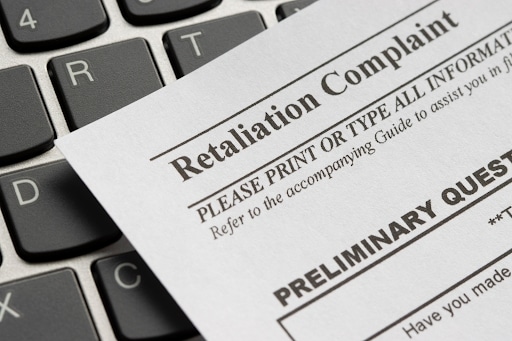Employment Law
- Discrimination

- Employer Retaliation

- Federal Employment Law
- FMLA and Paid Family Leave
- Hostile Work Environment
- Race Discrimination

- Wrongful Termination
- Labor Law
- Sexual Harassment
- Severance Agreements

- Wage & Hour Dispute
- Disability

- Whistleblower Protection
- Recovered millions for clients
- Available 24/7
- No fees until we win
- Free case evaluation
- We speak Spanish!
California Workplace Retaliation Attorney

Workplace retaliation is any negative punitive action by an employer or company leader against a staff member who has filed a formal complaint about workplace discrimination or harassment. In most situations, such negative actions are known to have an impact on the employment relationship between the employer and employee.
The act of reporting a discrimination claim is considered a protected activity by the Equal Employment Opportunity Commission (EEOC) and California Labor Code. Hence, it is unlawful for an employer or other company leader to respond to the complaint in a disciplinary or indecent manner.
Wrongful termination, unpaid wages, denying a raise, refusing paid sick leave, passing over for a promotion, lowering salary, stopping employees’ perks, reducing hours, and giving bad performance reviews in the absence of job-related performance concerns are just a few examples punitive measures considered to be retaliatory. In general, retaliation in the workplace is any form of negative treatment that goes against the employment contract as a result of the employee’s participation in a legal right.
Are Employees Protected From Retaliation in California?
Federal law and California wrongful termination laws prohibit employers from taking punitive measures against California employees who report or resist misconduct in the workplace. Wrongful termination occurs when an employer fires an employee illegally, which often involves a violation of federal anti-discrimination laws or a contractual breach. You can take action against employers who commit wrongful termination in California.
Employees in California and the United States are protected against such workplace retaliation under federal and state legislation. Furthermore, the law protects anyone who participates in any investigation that results from the complaint. This implies that workers who participate in an investigation cannot be subjected to retaliation for doing so and may not be wrongfully terminated.
How to File for Workplace Retaliation
The employee may contact the Division of Labor Standards Enforcement (DLSE). State investigators will be sent in to investigate the employer’s procedures to verify the complainant’s assertion. However, it’s crucial to remember that an employee has six months from the day any retaliatory action is taken to file a lawsuit.
An employee who feels that he or she has been subjected to unlawful workplace discrimination and retaliation can also file a civil lawsuit against the employer. To ensure that the action is filed in the proper state, you must employ the services of an experienced employee rights attorney. The plaintiff will generally claim wrongful termination or file a whistleblowing lawsuit. The employee will then sue the employer for compensation. Note that after experiencing workplace retaliation, an employee has two years to bring a civil case.
The employee will receive compensation if the employer is found to be at fault in a civil lawsuit. These payments are monetary and must cover lost wages, as well as any benefits which were lost because of retaliatory actions. In some wrongful termination lawsuits, if the employer is found responsible, he or she may be required to reimburse all attorney’s fees or court costs.
Contact Levine & Blit
In California, there are three things you must do before filing a claim for workplace retaliation. First and foremost, you must collect evidence to support your workplace retaliation or wrongful termination claim.
After that, you must document any reference to the specific retaliatory acts your employer has committed against you to prove wrongful termination. Finally, think about researching and archiving any previous evidence that supports your wrongful termination case.
In general, a successful retaliation defense or wrongful termination claims requires that you understand the basics of employment law and how it applies to your situation. You will need to know what qualifies as unlawful workplace harassment under California state law for you to qualify for remediation or monetary compensation. It is important to contact a California workplace retaliation lawyer who knows about workplace retaliation cases if you want to file a complaint with the California Labor Commission.
The team at Levine & Blit can assist. Our California fair employment law attorneys have experience in wrongful termination cases. These seasoned employment law attorneys have a thorough understanding of the California termination laws and can help you get the compensation you deserve.
Contact us at Levine & Blit if you want to talk about your wrongful termination lawsuit confidentially or have questions about California workplace retaliation law. We promise a confidential attorney-client relationship. Give us a call at 310-281-0100 to schedule a free evaluation with an employee rights attorney now.
